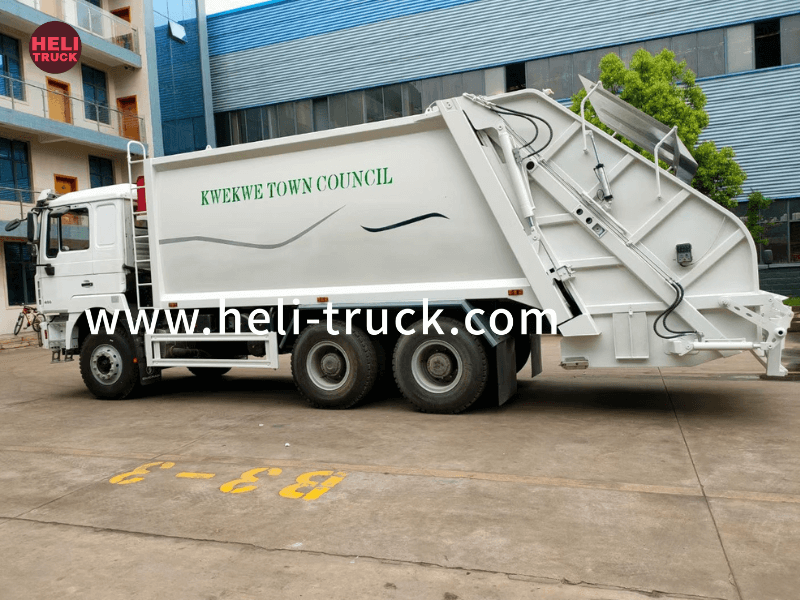Introduction
Garbage compactor trucks play a crucial role in waste management by collecting and compacting refuse from residential and commercial areas. These heavy-duty vehicles are specifically designed to handle large volumes of waste efficiently. However, the operation of garbage compactor trucks comes with inherent risks that must be carefully managed to ensure the safety of both the operators and the general public. In this comprehensive guide, we will explore the key safety considerations and best practices for operating garbage compactor trucks.
1. Understanding Garbage Compactor Truck Components
Before delving into safety procedures, it is essential to understand the key components of a garbage compactor truck. These vehicles consist of a chassis, engine, cab, compaction unit, hydraulic system, and loading hopper. The compaction unit comprises a blade or packer panel that compresses the waste, reducing its volume for efficient disposal. The hydraulic system powers the compaction mechanism and other functions of the truck.
2. Pre-Operational Safety Checks
Prior to operating a garbage compactor truck, operators must conduct thorough pre-operational safety checks to ensure that the vehicle is in optimal condition. This includes inspecting the tires, brakes, lights, hydraulic system, and compaction unit. Any defects or malfunctions should be promptly addressed by qualified mechanics to prevent accidents during operation.
3. Personal Protective Equipment (PPE)
Operators of garbage compactor trucks must wear appropriate personal protective equipment (PPE) to safeguard themselves from potential hazards. This includes high-visibility clothing, gloves, safety footwear, and eye protection. PPE helps reduce the risk of injuries and enhances the visibility of operators, especially when working in high-traffic areas.
4. Vehicle Stability and Weight Distribution
Maintaining vehicle stability is crucial when operating a garbage compactor truck, particularly during loading and compaction activities. Operators should be mindful of the truck's weight distribution to prevent rollovers or loss of control. Proper load securing techniques should be employed to ensure that the waste material is evenly distributed within the compactor body.
5. Safe Loading and Unloading Procedures
Loading and unloading waste materials require caution and attention to detail to prevent accidents and injuries. Operators should follow safe procedures when operating the loading hopper and engaging the compaction unit. It is essential to avoid overloading the compactor truck beyond its capacity, as this can lead to mechanical failures and safety hazards.
6. Traffic Management and Communication
Garbage compactor truck operators often work in busy urban areas where traffic congestion is common. Effective traffic management strategies should be employed to minimize the risk of accidents and ensure smooth operations. Clear communication between operators and other road users is essential to prevent collisions and maintain a safe working environment.
7. Emergency Procedures and Response
In the event of an emergency or breakdown, garbage compactor truck operators must be prepared to respond swiftly and effectively. Comprehensive emergency procedures should be established, including protocols for contacting emergency services, evacuating the vehicle, and securing the site to prevent further risks to public safety.
8. Maintenance and Inspections
Regular maintenance and inspections are essential to ensure the safe and reliable operation of garbage compactor trucks. Scheduled service intervals should be adhered to, and any issues identified during inspections should be promptly addressed. This proactive approach helps prevent unexpected breakdowns and ensures that the vehicle remains in optimal condition.

9. Training and Certification
Proper training and certification are fundamental requirements for garbage compactor truck operators to perform their duties safely and efficiently. Truck mounted crane load testing should cover vehicle operation, safety procedures, emergency response protocols, and regulatory compliance. Operators should be periodically evaluated to assess their knowledge and skills, with opportunities for ongoing professional development.
10. Regulatory Compliance and Industry Standards
Garbage compactor truck operations are subject to regulatory requirements and industry standards that aim to ensure the safety of operators and the public. Compliance with local, state, and federal regulations is essential to avoid penalties and maintain a positive safety record. Operators should stay informed about legislative changes and best practices in waste management to uphold safety standards.
Conclusion
Garbage compactor trucks are indispensable assets in waste management operations, but their safe operation requires careful attention to various factors. By implementing the safety considerations outlined in this guide, operators can mitigate risks, prevent accidents, and promote a culture of safety in their work environment. Remember, safety is everyone's responsibility, and by prioritizing safety measures, we can ensure the well-being of all individuals involved in garbage compactor truck operations.
